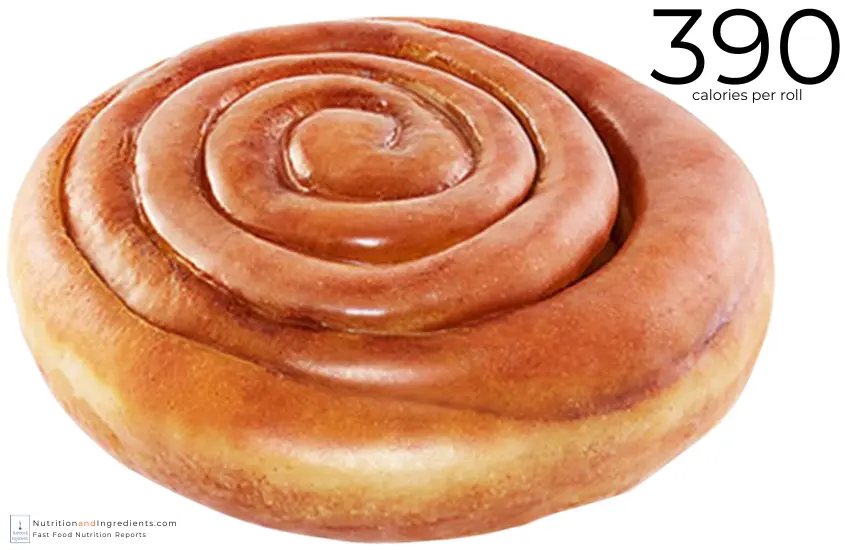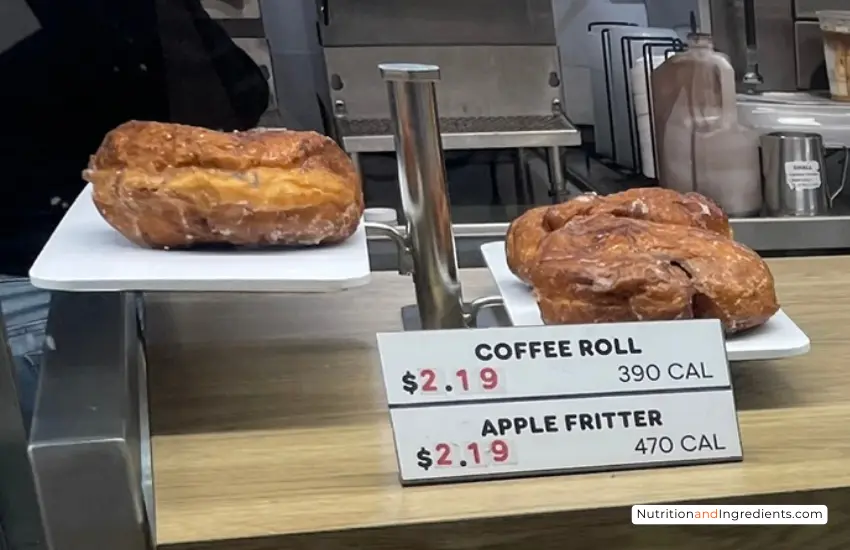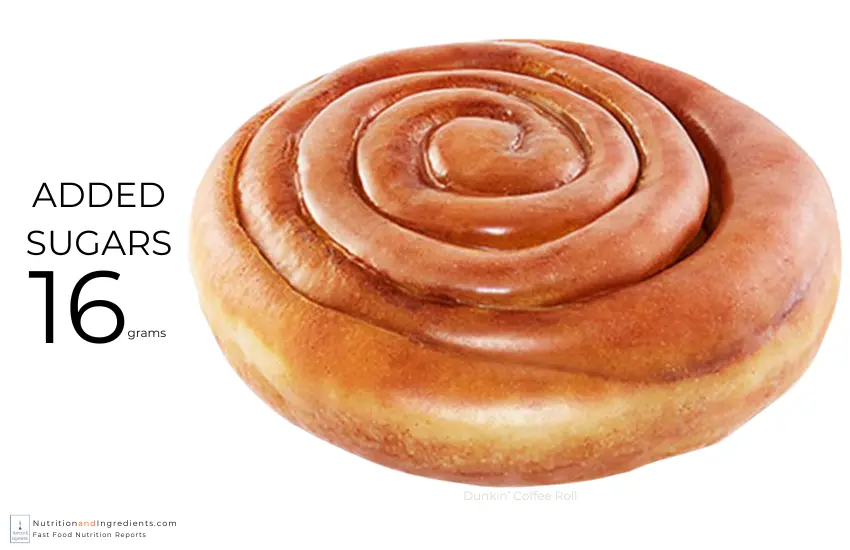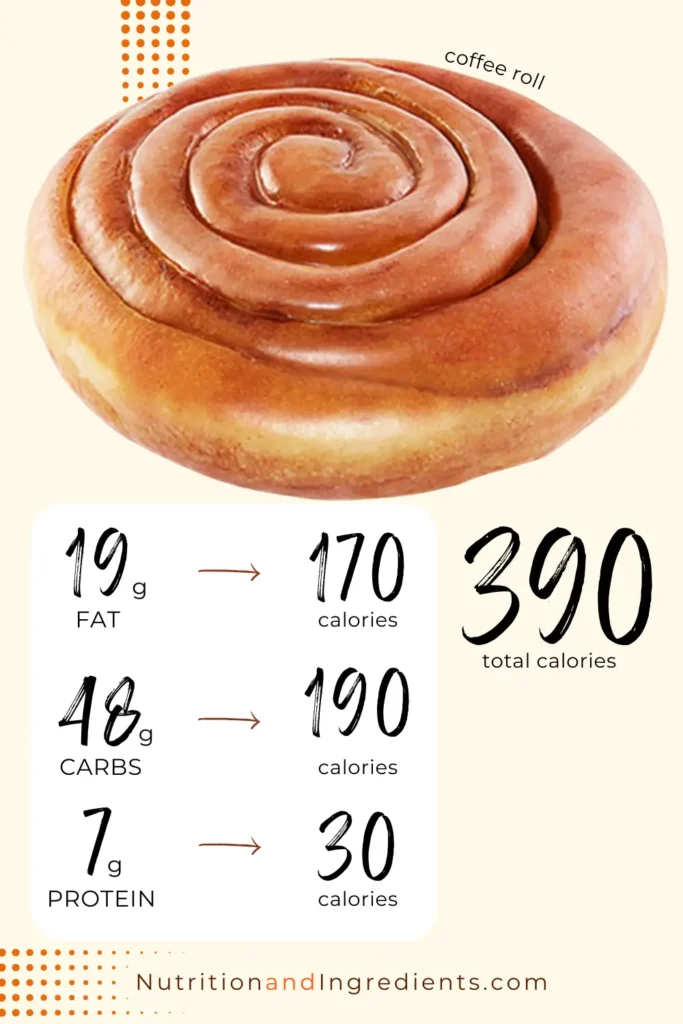Dunkin’ Coffee Roll

A Dunkin’ coffee roll is a soft cinnamon-flavored pastry covered in a thin layer of sweet icing.
One serving of the coffee roll has 390 calories, 19 grams fat, 48 grams carbohydrates, and 7 grams protein.
Read this report for a detailed overview of the nutrition facts, calories by macro, ingredients, and allergens in the sweet cinnamon pastry.
Dunkin’ Coffee Roll Nutritional Information

Calories
There are 390 calories in one Dunkin’ Coffee Roll. Nearly all of the calories are derived from fat and carbohydrates.
Here is a summary of the calories by macronutrient, per pastry:
Carbohydrates contribute about 49% of the total calories. Dietary fats make up 44% of the total calories, and the remaining 8% is from protein.
Dunkin’ Coffee Roll
% calories from fat, carbs and proteinCalories by maconutrient are rounded estimates based on nutrition facts information provided by Dunkin’.
Time to Burn Calories
An average adult would need to run at a moderate pace for approximately 30 minutes to burn off the calories from a coffee roll pastry.
Here is a list of approximate times required to burn 390 calories, by type of exercise.
FITNESS TIME TO BURN 390 CALORIES
Estimate based on moderate level of activity by an adult with average BMI.

Learn more about fast food. Compare the nutritional value of the breakfast pastry to a chocolate frosted donut or the breakfast bowl with bacon and egg from WaWa.
Check the amount of saturated fat, sodium, and added sugars to determine if any of the menu items are the best option for your diet.
Nutrition Facts
Here is a copy of the nutrition facts label for a Dunkin’ Coffee Roll.
Amount (%DV) per Pastry
Red indicates a high %DV.
|
Calories |
390 |
%DV |
|
Total Fat |
19g |
24% |
|
Saturated Fat |
8g |
40% |
|
Trans Fat |
0g | |
|
Cholesterol |
0mg |
0% |
|
Sodium |
440mg |
19% |
|
Carbohydrates |
48g |
17% |
|
Dietary Fiber |
2g |
7% |
|
Total Sugars |
17g | |
|
Added Sugars |
16g |
32% |
|
Protein |
7g |
%DV based on a 2,000 calorie diet. Calorie needs vary and your %DV may be higher or lower. Provided for informational purposes only. Consult with your physician for dietary or healthcare advice.
Daily Value
Daily Value (%DV) measures the amount of a nutrient per serving, relative to the recommended limit. Use %DV to compare and select foods for a balanced diet.
As shown in the chart below, Dunkin’s Coffee Roll is high in saturated fat and added sugars.
|
%DV |
Level | |
|
Saturated Fat |
40% |
HIGH |
|
Added Sugars |
32% |
HIGH |
%DV based on 2,000 calorie diet. FDA suggests a %DV of 5% or less is low and 20% or more is high.
Total Fat
Ingredients are listed in order of dominance by weight and palm oil is a top three ingredient in the coffee roll. According to Harvard Health, palm oil is high in saturated fat.
One coffee roll from Dunkin’ Donuts has 19 grams of fat, including 8 grams of saturated fat. The amount of saturated fat has a 40% daily value.
Calculate Daily Value
To calculate %DV, divide the amount of a nutrient in one serving by the FDA-recommended daily limit.
|
per Roll |
Daily Limit* |
Daily Value | |
|
Total Fat |
19g |
78g |
24% |
|
Saturated Fat |
8g |
20g |
40% |
*Based on FDA general nutrition advice for an adult following 2,000 calorie daily diet.
Summary of Fat in a Coffee Roll
Total Sugars
Of the 17 grams of total sugars, 16 grams are added sugars. That is high.
Dietary Guidelines for Americans suggest limiting calories from added sugars to less than 10% of total calories.
The added sugars in one coffee breakfast roll delivers approximately 65 calories. That is 32% of the recommended value for an entire day (based on a 2,000 calorie daily diet).
Added Sugars are a nutrient to get less of.
U.S. Food & Drug Administration

Review the full Dunkin’ menu with nutrition facts
Dunkin’ Coffee Roll Ingredients and Allergens
Here are the ingredients in Dunkin’s coffee roll and the glaze topping.
Ingredients
|
Coffee Roll |
|
Enriched Wheat Flour, Water, Palm Oil, Yeast Donut Concentrate, Enzymes, Annatto Extract (color), Yeast, Dextrose, Soybean Oil, Cinnamon, and Mono and Diglycerides. |
|
Glaze |
|
Sugar, Water, Maltodextrin, Corn Starch, Mono and Diglycerides, Citric Acid, Agar, Cellulose Gum, Potassium Sorbate, and Artificial Flavor. |
Allergens
The Dunkin’ coffee roll is made with milk, eggs, soy, and wheat.
If you have a food allergy, check the full allergen guide for Dunkin’s menu and consult with your physician before deciding which food is right for you.

Nutrition facts, prices, and ingredients are based on available information as of the date of publication. Restaurants and food manufacturers may change recipes or formulations without notice. Check package labels and ask the product manufacturer or restaurant for the most up-to-date information. Unless otherwise stated, %DV is based on a 2,000 calorie diet. All reports and reviews published on this site are for informational purposes only. NutritionandIngredients.com does not provide healthcare advice or dietary recommendations. Always consult your licensed physician for any healthcare or dietary advice.
Nutrition facts, allergens, and ingredients source: Dunkin’. Image credits: Nutrition & Ingredients and Evan-Amos, Public domain, via Wikimedia Commons. Original designs by Nutrition & Ingredients for fast food nutrition research and reports.
